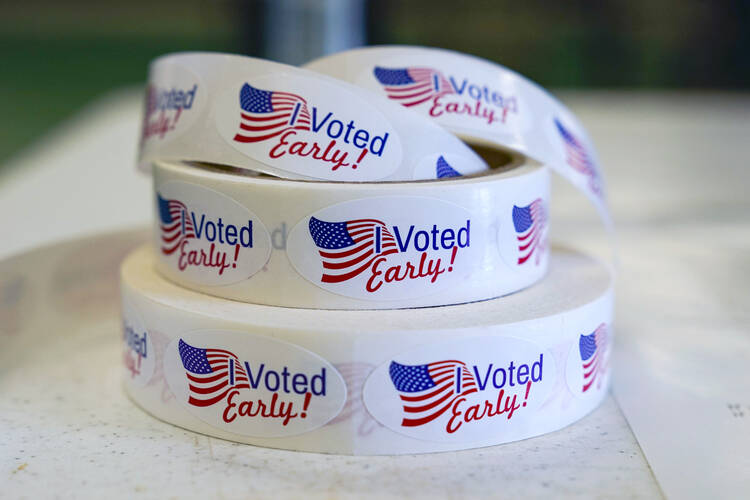Some of us are old enough to remember when midterm elections were pretty boring. Majorities of voters simply ignored them. Indeed, it was a source of frustration for media and educational institutions who tried to help gin up interest in voting. Most of the time it didn’t work.
But today we find ourselves in a completely different place. A recent NBC News poll, for instance, found that voter interest in this election has reached an all-time high for a midterm.
Civic-minded Americans might think that is good news, but other numbers put what has happened in a more sobering light. About 80 percent of both Democrats and Republicans believe that the country will be “destroyed as we know it” if the other party is not stopped in this election.
About 80 percent of both Democrats and Republicans believe that the country will be “destroyed as we know it” if the other party is not stopped in this election.
People aren’t getting out to vote in record numbers because they are paying closer attention to policy debates over the Iran nuclear deal or how to improve educational outcomes after the Covid-19 learning loss. They have been convinced that they must vote in light of an existential threat posed by a merciless “other” who wants to destroy them.
The causes of these trends have been well-documented, but they are worth reviewing here again. We have known for some time that negative partisanship works much better than positive efforts in terms of getting people out to the polls. But now the well-paid political and media consultants for each party and major campaign have the latest technology available to micro-target voters with advertisements and social media posts that will most efficiently cultivate a passionate fear and loathing of “the other side.”
This vulnerability is especially acute for people who have seen our post-modern culture hollow out their positive identity in favor of an identity primarily defined by opposition and even hatred of the other. If your primary identity does not come from being part of a family, a church or a profession, micro-targeters have a target-rich environment for directing the kinds of algorithms your way that are most likely to get you to the polls.
In my new book One Church: How to Rekindle Trust, Negotiate Difference, and Reclaim Catholic Unity, I have created a field guide for resisting these idolatrous political forces and temptations with a laser-like focus on where our ultimate loyalties must lie as Catholics: with our church family.
Going all the way back to Peter and Paul, the pillars of the church, white-hot anger and debate over legitimate disagreements have always been part of who we are. And they always will be.
Focusing on our common baptism can help us see this bond, for it is through our baptism that we died to self and were reborn as a member of the body of Christ. It is through our baptism that we are reborn into a new family, the church, where our fellow churchgoers are now our siblings. Indeed, if we are honest with ourselves about what Jesus says about these matters in the Gospel, it may be that Christians should consider the family ties created by the waters of baptism stronger than those created by blood.
This can be difficult to accept, especially in our current hyperpartisan moment, but it is what Catholics are called to see and do. Happily, the Catholic family is very familiar with disagreement. Going all the way back to Peter and Paul, the pillars of the church, white-hot anger and debate over legitimate disagreements have always been part of who we are. And they always will be.
But when you start with the bonds of family as the foundation, that white-hot anger and debate comes not in the context of hollowed-out individuals bouncing around consumerist digital spaces but rather in the context of positively identified individuals in a thick community of the church and grounded by their ultimate theological concerns.
We are not united in love in spite of our legitimate diversity of viewpoints and roles but because of them.
The political debates before us in the midterms are not unimportant, of course. But if Catholics see these debates rightly, we will never allow them to fundamentally orientate ourselves in opposition to fellow Catholics as “the other.” On the contrary, when we engage in political debate with our fellow Catholics, no matter how hot it gets, we rest assured knowing that what unites us will always be stronger and a higher priority than our political disagreements.
Indeed, I argue in One Church that this foundational unity is what allows for a genuine openness to legitimate diversity. Because having a relationship at all requires difference, there is no way for the people of God to be in a genuinely loving relationship with each other without a deep commitment to difference. We are not united in love in spite of our legitimate diversity of viewpoints and roles but because of them.
Healthy families still have fights. Sometimes the fights are even good for the family, as they allow difficult truths to be spoken at key times and when they otherwise might not be spoken at all. But, again, healthy families rest secure in knowing that the bonds which connect us cannot be broken, even by this next “most important election of our lifetimes.”
So let’s have the arguments. Let’s go vote. And then let’s argue some more. Many of the issues at stake are indeed very important. But let’s do this fully grounded in our primary commitment to the church, our Catholic family, as a place of unity in legitimate diversity.








